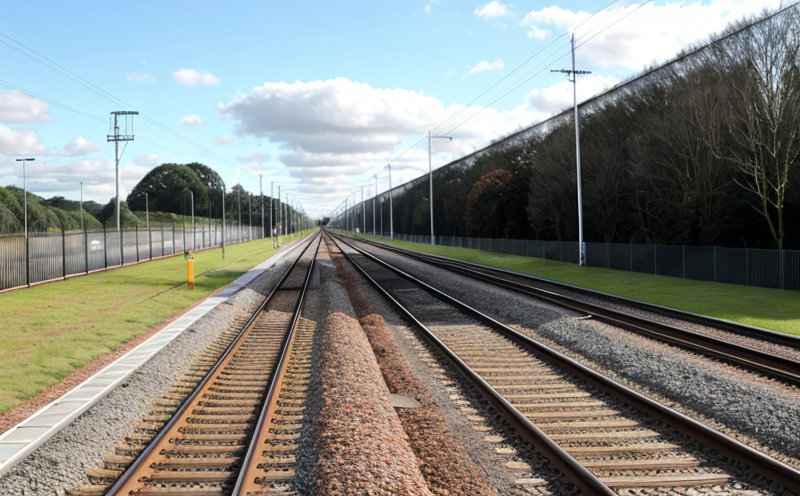ASTM E8 Tensile Testing of Rail Steel Materials
The ASTM E8 standard specifies the tensile testing procedure used to determine the mechanical properties of metallic materials, including rail steel. This test is crucial for ensuring that rail steel meets specific strength and ductility requirements necessary for safe and efficient railway operations.
Tensile testing involves subjecting a specimen to progressively increasing tensile load until it fails. For rail steel, this typically means evaluating the material's yield strength, ultimate tensile strength (UTS), elongation, and reduction of area. These properties are critical in assessing the suitability of rail steel for use in high-stress environments such as railway tracks.
The ASTM E8 standard is widely recognized and used globally due to its stringent requirements and standardized methodology. Compliance with this standard ensures that the materials meet industry benchmarks and can be relied upon for safe, reliable performance. The testing procedure involves several steps:
- Selection of appropriate specimen dimensions
- Cleaning and preparation of the test specimen
- Application of a tensile load at a controlled rate
- Recording of load-deflection data during the test
- Evaluation of the specimen after failure to determine properties such as UTS, yield strength, and elongation
The results of ASTM E8 testing are essential for quality assurance in railway manufacturing. They help ensure that rail steel is not only strong enough to withstand the stresses encountered during operation but also ductile enough to absorb energy during impact without fracturing catastrophically.
| Key Parameters | Description |
|---|---|
| Tensile Load Application Rate | The rate at which the load is increased during the test, typically specified in MPa/second or kN/s. |
| Specimen Type and Dimensions | Rectangular specimens with specific dimensions to ensure accurate measurement of properties. |
| Elongation Measurement | The percentage increase in length of the specimen after fracture, used as an indicator of ductility. |
| Reduction of Area | The percent reduction in cross-sectional area at maximum load compared to original cross-sectional area. |
In summary, ASTM E8 tensile testing is a vital part of the quality control process for rail steel materials. It provides critical data that ensures the safety and reliability of railway infrastructure by validating that the materials used meet the required mechanical properties.
Scope and Methodology
The scope of ASTM E8 tensile testing includes the determination of tensile strength, yield strength, elongation, and reduction of area for metallic materials. The methodology involves several key steps to ensure accurate and reliable results:
- Specimen Preparation: Specimens are cut from the rail steel material according to specified dimensions.
- Cleaning: The specimens are cleaned to remove any surface contaminants that could affect test results.
- Tension Testing: Tension testing is performed using a universal testing machine (UTM) with a controlled load application rate.
- Data Recording: Load-deflection data is recorded throughout the test, allowing for precise determination of mechanical properties.
- Evaluation: The specimen is examined after failure to determine the final tensile strength and other relevant properties.
The ASTM E8 standard specifies detailed procedures for each step of the testing process. Compliance with these procedures ensures that test results are accurate, reproducible, and comparable across different laboratories.
The universal testing machine (UTM) used in this procedure must meet specific standards such as ISO 6892:2019 to ensure its accuracy and reliability. The UTM applies the tensile load at a controlled rate, typically between 5 and 30 MPa/s, depending on the material being tested.
The results of ASTM E8 testing are critical for ensuring that rail steel materials meet stringent safety and performance requirements. Compliance with this standard is essential for manufacturers looking to maintain high-quality standards in railway infrastructure.
Eurolab Advantages
At Eurolab, we offer comprehensive ASTM E8 tensile testing services tailored specifically to the needs of the railway and transportation sector. Our advantages include:
- State-of-the-Art Equipment: We use advanced universal testing machines that meet or exceed international standards.
- Experienced Technicians: Our team of highly skilled technicians ensures accurate and reliable test results.
- Comprehensive Reporting: Extensive reports are provided, including detailed data analysis and compliance with ASTM E8 standards.
- ISO 9001:2015 Certified: We maintain ISO 9001:2015 certification to ensure quality in all our processes.
- Compliance Expertise: Our team has deep expertise in railway and transportation testing, ensuring that your materials meet the highest industry standards.
By choosing Eurolab for your ASTM E8 tensile testing needs, you can be assured of high-quality results that meet or exceed international standards. Our commitment to excellence ensures that your rail steel materials are safe and reliable, contributing to the overall integrity of railway infrastructure.
Customer Impact and Satisfaction
The impact of ASTM E8 tensile testing on customers in the railway and transportation sector is significant. By ensuring that rail steel materials meet stringent mechanical property requirements, we help manufacturers:
- Ensure Safety: Materials tested to these standards are safer for use in high-stress environments.
- Promote Reliability: Reliable materials contribute to the longevity and efficiency of railway infrastructure.
- Meet Regulatory Requirements: Compliance with ASTM E8 ensures that products meet regulatory requirements, avoiding potential delays or issues during certification processes.
- Enhance Reputation: Demonstrating compliance with international standards enhances a manufacturer's reputation in the industry.
Our customers report high levels of satisfaction with our testing services. They appreciate the accuracy and reliability of our results, as well as the comprehensive reports we provide. Many have noted that these factors contribute positively to their overall business operations and customer relations.
We are committed to delivering exceptional service and ensuring that your materials meet or exceed international standards. Contact us today to learn more about how Eurolab can support your ASTM E8 testing needs.





